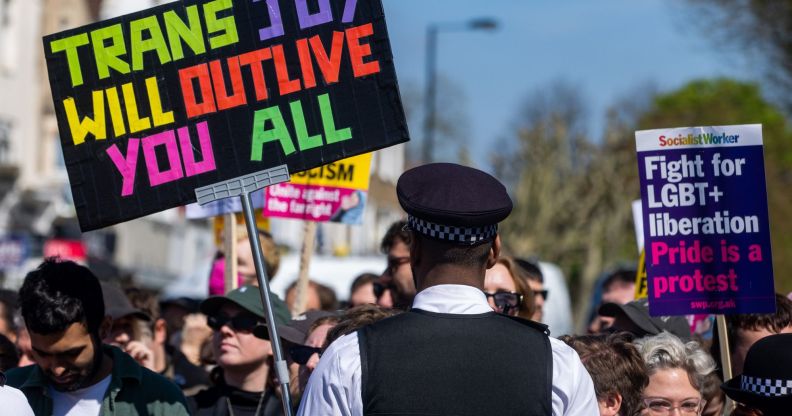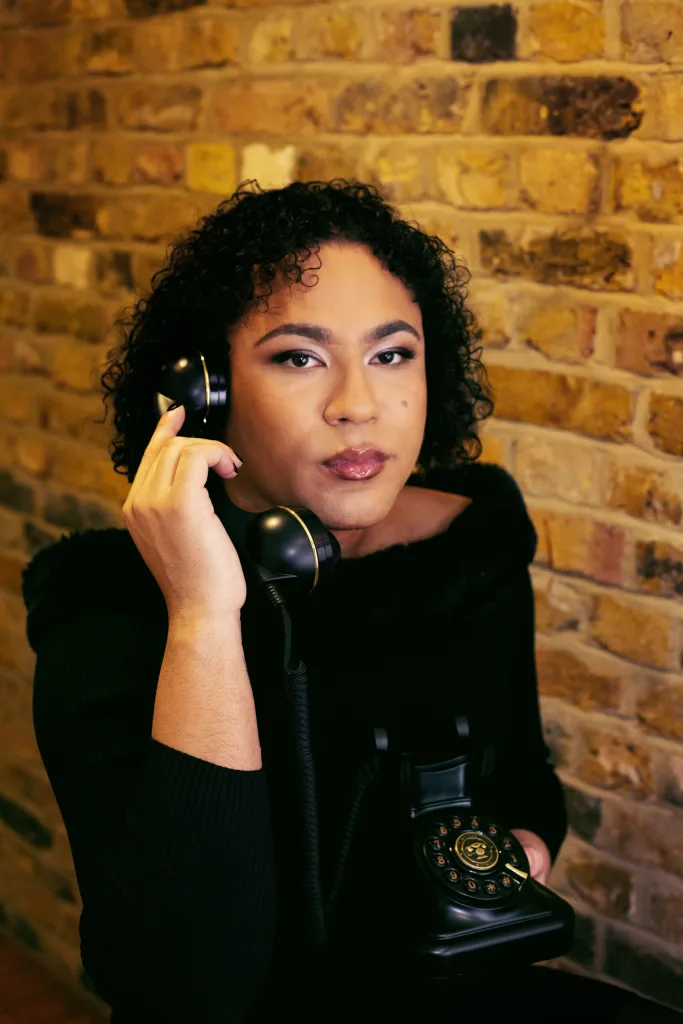Spreading queer joy and comedy is essential, says playwright Octavia Nyombi

A person holds up a sign reading ‘Trans joy will outlive you all’ in support of the LGBTQ+ community. (Getty)
When All Is Said is a collection of five short plays written by five Black trans writers: Travis Alabanza, Felix Mufti-Wright, Octavia Nyombi, Ebun Sodipo and Campbell X.
Curated by Travis Alabanza (Burgerz) and directed by Emily Aboud (Splintered) and Leian John-Baptiste, the plays are delivered over the phone by trans actors. Audience members purchase a ticket, enter their phone number and listen in as the story is told directly to them in real time.
As the project tours the UK, PinkNews spoke to Octavia Nyombi about this unique project, telling the stories of Black trans lives and the secrets she’d share with a complete stranger.
What do you hope to achieve through your play?
When embarking on this project together with Fuel Theatre in 2022, I was told I could write about whatever I wanted, and that my only content brief was to write what “brings you joy”. While I always have a lot to say about the world in my art, spreading queer joy and comedy was essential.
Now that the play is finally being heard by audiences, my offer to audiences to listen to a joyful, queer relief feels ever more important and timely. In a time where our community is under attack from some loud, powerful minorities, often in the public eye, I hope my play can counter this negative narrative with something honest, hopeful and wonderful about the trans experience.
What questions does it raise, and how does it make you feel?
For me, the central question is: how can someone discover and explore their identity with so much race, gender and identity policing around them?”
The question itself makes me feel frustrated with many people’s limited understanding beyond gender norms and beyond the binary, and their limited openness to gender and sexual fluidity. Albeit, the fact that so many of us are surrounded by these people, yet are still able to find ourselves and our community makes me feel hopeful, optimistic and joyful.
This play is a whole range of my own experiences mashed together, very much theatricalised and of course, in no particular order. Quoting from the opening song of my audio play, “Uni Days” – I was often told by lecturers, friends and many promotional uni ads that uni is “the place you’re supposed to feel free”.
Yet in my days of being a uni student, which we see through the central character Ari, I regularly found my identity being policed by well-meaning friends, family, university staff and retail workers to name a few.
For me personally, pushing against this policing started small, such as sending messages with the female and gender-less emojis, privately watching YouTube videos by trans creators and secretly playing with makeup with my best friend in her flat.
These are just a few examples from one trans person’s experience, but when I think about queer liberation pushing against this policing holistically, it brings me joy and pride to see all the different, resilient and brave ways we as queer people find a way to be ourselves, in a societies, schools, hospitals, families and communities that don’t understand us.
What connections do you hope to build by delivering the play over the phone specifically?
For me personally, collaborating with this fantastic, high-flying trans team has been a privilege and I feel so lucky to have been curated into this by Travis [Alabanza].
When listening to Libra perform my play to me over the phone, I was brought to so many tears, so much laughter and so much surprise. It was a truly special experience having my own writing performed back to me, for that moment of time together.

For audiences, I hope share with them the gift of queer joy. Whether as an ally getting a glimpse of our secrets, or as someone from our community uplifting and celebrating our queer joy together. This is expertly done with Libra’s impressive vocal range for all the different character’s Ari encounters, breaking expectations of what audiences may expect of a ‘femme performer’.
On the very front page of my script, I made it very clear that: “This script is intended to be accessible for any trans performer. I have tried to keep the character quite flexible, however certain details can be amended and/or added in if needed to be.”
This was as I always hoped for our actor to feel agency to share themselves and their own personality when performing this over the phone, and when listening to the play you can tell Emily Aboud has done a fantastic job of facilitating that with Libra.
Thinking further into the future, if there are young trans actors listening, or reading this article – I always hoped provide a resource that would allow queer youth to find a monologue and/or short play that reflects their own personality and life experience. One that they can mould to themselves, rather than mould into with a binary gender, or a hugely different accent or age to them.
What do you wish people in the UK better understood about the Black trans experience?
We don’t owe you information about our lives.
When someone decides to transition, it’s not a group or family decision. It’s not a decision we’ll come together, being heavily guided by your pre-conceptions. It’s our decision. And only our decision. It’s a decision you’ll accept and celebrate and support us with.
We are the experts of our lives.
To borrow from the show description: What secrets would you tell a complete stranger?
Yes we have sex too. Yes, we enjoy it. And yes, we’re pretty awesome at it.
Often, but not always, queer spaces in the UK can be very white spaces. Yet often, but not always, Black spaces can be very cis-het. Whenever I go to one of these spaces, I feel I have to tone down one side of my identity to fit in. I feel the judgement of having to ‘pick’ an identity to join a space, when in. Reality what makes us unique, exciting and fun to be around is our whole self.
When All Is Said played at Shoreditch Town Hall in May, with more LGBTQ+ works set for later this year.
How did this story make you feel?

